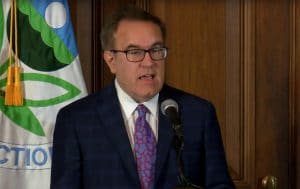
EPA Administrator Andrew Wheeler said a final proposal on the rollback of fuel economy standards won’t be ready until the end of the year.
Those waiting for the revised fuel economy standards coming from the Trump administration will be waiting a few months longer as the U.S. Environmental Protection Agency won’t have them until the end of the year.
The administration has been working on a final set of numbers, in earnest, for the past 18 months, and were expected have the task completed by now. EPA chief Andrew Wheeler said on Tuesday that the final proposal won’t be “exactly like” the original concept.
Trump revealed in August 2018 he planned to freeze fuel efficiency standards at 2020 levels through 2026, rolling back the standards put in place by the Obama administration. Since then, the administration’s plan has been roundly criticized by environmental groups and not found favor with the automakers Trump claims it will help.
(Automakers Push Back on Trump Plans to Relax Mileage Rules)
Wheeler noted the revisions to the vehicle efficiency and emissions standards, which are overseen by EPA and the Department of Transportation, are also still under consideration.
Several automakers initially came out in support of the move to freeze the standards, but have since reversed course. In fact, eight automakers recently signed deals with California and Colorado to meet fuel efficiency and emissions standards tougher than the proposed Trump version, but less arduous than the Obama plan.
Honda was one of four automakers – the others being Ford, BMW and Volkswagen – to announce an agreement with California this past July that would only slightly roll back the targets set by the California emissions and mileage mandate.

President Donald Trump criticized several automakers for making a deal with California for tougher fuel efficiency standards in July.
(Four Automakers Sidestep Trump, Make Fuel Economy Deal with CARB)
Others, notably including Mercedes-Benz, were widely expected to join in, according to David Cole, director-emeritus of the Center for Automotive Research – at least until the U.S. Justice Dept. announced it was launching an antitrust probe looking at the four initial automakers that entered into the agreement.
Shortly after the deal with California, the state of Colorado signed a similar pact with General Motors, Hyundai, Volkswagen and Toyota. The move came about because the multiple states that adhere to California’s guidelines wanted to ensure other automakers would follow suit.
While automakers have sought a single national standard – even if it meant going with California’s – and some easing of mileage standards, they also recognize there is strong support for increasing mileage.
(Trump Chides Automakers for Making Deal With California)
One survey, released by Consumers Union last month, found 88% of American adults demanding improved mileage for all classes of vehicles. Even among buyers of the biggest vehicles on the road, like full-size pickups, the figure was 73%.
